

La dernière frontière de l’huile de palme Afrique - Briefing.pdf. Yield gap study highlights potential for higher crop yields in Africa. Agricultural yields could more than triple in a number of African countries, suggesting that tremendous improvements in food security are possible, according to new findings by the Global Yield Gap and Water Productivity Atlas.
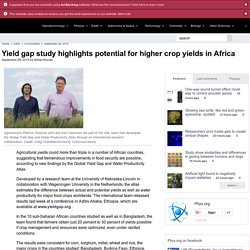
Developed by a research team at the University of Nebraska-Lincoln in collaboration with Wageningen University in the Netherlands, the atlas estimates the difference between actual and potential yields as well as water productivity for major food crops worldwide. The international team released results last week at a conference in Addis Ababa, Ethiopia, which are available at www.yieldgap.org . In the 10 sub-Saharan African countries studied as well as in Bangladesh, the team found that farmers obtain just 20 percent to 30 percent of yields possible if crop management and resources were optimized, even under rainfed conditions. The atlas uses a bottom-up approach, scaling site-specific data to regional and global levels.
African Agricultural Experts Promote Non-traditional Food. Food insecurity remains a top concern in Africa, especially with the continent's population expected to double in the next 35 years.
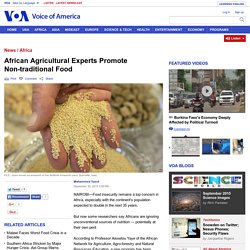
But now some researchers say Africans are ignoring unconventional sources of nutrition — potentially at their own peril. According to Professor Aissetou Yaye of the African Network for Agriculture, Agro-forestry and Natural Resources Education, a new program has been designed to promote the use of neglected or underutilized types of food resources that are readily available. “We realized that people are mainly focusing on transformation of usual crops or animals," she said, describing research findings that are now being used to develop university curricula on neglected or underutilized sources of nutrition.
"When it comes to crops, trees and animals, particularly wildlife, you have a lot of species that could also be used to develop enterprises and business that are kind of forgotten.” Agricultural Growth Corridors. Uganda: Adding Value to African Vegetables - allAfrica.com. Opinion By Lominda Afedraru African Indigenous Vegetables (AIVs) are considered a significant contributor to food security and nutrition for smallholder farmers in East Africa.
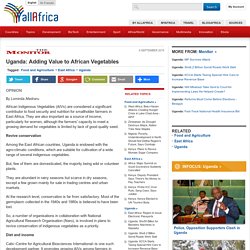
They are also important as a source of income, particularly for women, although the farmers' capacity to meet a growing demand for vegetables is limited by lack of good quality seed. Revive conservation Among the East African countries, Uganda is endowed with the agro-climatic conditions, which are suitable for cultivation of a wide range of several indigenous vegetables. Why bananas as we know them might go extinct. They tasted better, they lasted longer, they were more resilient and didn't require artificial ripening.
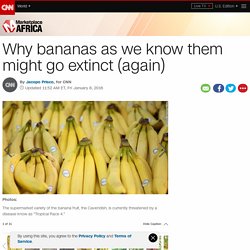
They were -- simply put -- a better fruit, because they belonged to a different species, or cultivar in banana parlance. That year, it was declared commercially extinct due to the Panama disease, a fungal disease that started out from Central America and quickly spread to most of the world's commercial banana plantations, leaving no other choice but to burn them down. The banana industry was in deep crisis, and had to look for alternatives. It settled with the Cavendish cultivar, which was deemed an inferior product but carried the distinction of being immune to the disease. Les possibilités en matière d'agroalimentaire en Afrique seront dévoilées lors du quatrième Sommet sur l'agriculture commerciale - Communiqués de presse. RadioVop Zimbabwe - Food Deficits Mount As Urban Farming Mushrooms In Africa.
Urban farming is mushrooming in Africa as starvation hits even town and city dwellers.
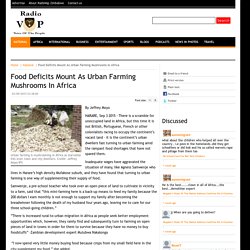
Credit: Jeffrey Moyo/IPS. Calestous Juma: Technological innovation and entrepreneurship will unlock Africa's agribusiness promise like in China. At a well-appointed demonstration lab in one of Chennai Municipal Corporation’s so-called “model” schools, the chemistry teacher, speaking in Tamil, tells me that science is taught in English in high school.
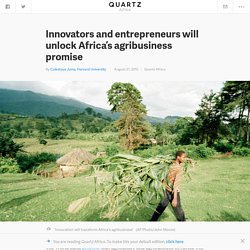
I ask her whether the classroom discussion was also in English. “For discussion, I allow Tamil, but I explain the concepts only in English,” she says. Since she had needed an interpreter to understand my question, I ask her whether she read out concepts to the class from a textbook. She says yes. Investing in Africa's agriculture is the next best thing. Tendai Dube Last Updated: 13 August 2015|18:49 GMT Investors are being encouraged to looking at incorporating African agriculture into their portfolios.
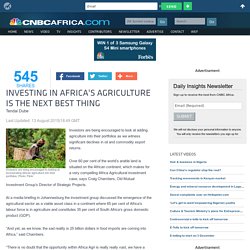
Photo: Flickr Investors are being encouraged to look at adding agriculture into their portfolios as we witness significant declines in oil and commodity export returns. Over 60 per cent of the world’s arable land is situated on the African continent, which makes for a very compelling Africa Agricultural investment case, says Craig Chambers, Old Mutual Investment Group’s Director of Strategic Projects.
L’agriculture emploie 62% des femmes actives en Afrique (Rapport) (Agence Ecofin) - En Afrique, l’agriculture est le premier pourvoyeur d’emplois pour les femmes.
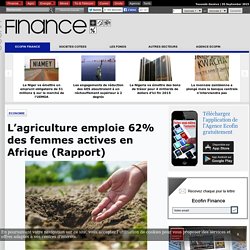
Selon un rapport de la Banque africaine de développement (BAD), 62% des femmes actives exercent dans ce secteur dont elles constituent plus de la moitié de la main d’œuvre totale. Dans certains pays comme le Burkina Faso ou le Rwanda, la main d’œuvre agricole est essentiellement féminine avec des pics allant au-delà de 90% de la population agricole totale. Cependant, souligne le rapport, cette prépondérance des femmes ne se traduit pas par un meilleur traitement pour elles. En effet, beaucoup d’entre elles sont sous-payées, manquent d’accès aux financements et surtout n’ont pas droit à la propriété foncière. Pour illustrer ces disparités, le rapport s’appuie sur des statistiques frappantes.
Des disparités qui empêchent le continent de développer pleinement son potentiel agricoles, affirme l'étude. Aaron Akinocho. Untitled. Data of all kinds are notoriously scarce for Sub-Saharan Africa, and geospatial data—that is, maps—on agriculture, poverty, and the environment are no exception.
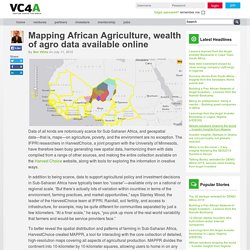
The IFPRI researchers in HarvestChoice, a joint program with the University of Minnesota, have therefore been busy generating new spatial data, harmonizing them with data compiled from a range of other sources, and making the entire collection available on the Harvest Choice website, along with tools for exploring the information in creative ways. In addition to being scarce, data to support agricultural policy and investment decisions in Sub-Saharan Africa have typically been too “coarse”—available only on a national or regional scale. “But there’s actually lots of variation within countries in terms of the environment, farming practices, and market opportunities,” says Stanley Wood, the leader of the HarvestChoice team at IFPRI. HarvestChoice’s MAPPR tool can present many layers of data at once.
Agro-industrie : l'Afrique vers l'autosuffisance ? Sweet potato: answer to malnutrition in Africa? Sweet potato: answer to malnutrition in Africa?
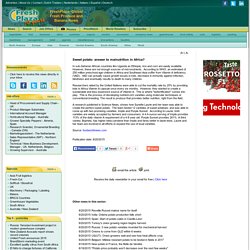
In sub-Saharan African countries like Uganda an Ethiopia, rice and corn are easily available. However, these are not enough sources of micronutrients. According to WHO, an estimated of 250 million preschool-age children in Africa and Southeast Asia suffer from Vitamin A deficiency (VAD). VAD can actually cause growth issues in kids, decrease in immunity against infection, blindness and eventually results to death to many children. Researchers aided by the United Nations were able to cut the mortality rate by 25% by providing kids in Africa Vitamin A capsule once every six months. A research published in Science News, shows how Sunette Laurie and her team was able to create the perfect sweet potato. Source: foodworldnews.com. Production mondiale de céréales en 2020 Le sorgho n’a pas encore le vent en poupe. Un laboratoire pour relever la production des légumes. Challenges And Opportunities In Agriculture In Africa - Real Estate and Construction - Worldwide.
Some thoughts on unlocking the potential of the agriculture sector in Africa. This month I thought I would turn to the agriculture sector in Africa. This came off the back of my colleague, Jeremy Cape, and I travelling to Kyiv, Ukraine (yes Kyiv) to talk to some Ukrainian clients who want to access the African agriculture market. Ukraine is the breadbasket of Europe. And, as the plane descends into Kyiv airport, you can see vast expanses of cultivated farmland with closely packed crops. Food security in Africa needs a tailored approach, suggests new research. A one-size-fits-all approach to African agriculture development will not lead to growth, suggests research published in Food policy. The authors of the study say that instead of blindly adopting 'solutions' that have worked in other continents, governments and researchers should consider the context more closely and develop a tailored approach.
Selected by an international advisory board, the research paper has been awarded this month's Elsevier Atlas award. The researchers suggest that developing new technologies - to improve the output of tree and root crops that are predominant in Africa, and reduce the need for manual labor - would be more effective than copying the approaches that worked in Asia and Latin America. "Assuming Africa is an appropriate setting for another Asian-style Green Revolution is misleading and could result in, yet again, a frustrated attempt to attain sustainable agricultural growth," said Dr. Alejandro Nin-Pratt, lead author of the study. Why Africa offers growing opportunities for agricultural products - South African exports to the rest of the continent have more than doubled over the past 20 years. This has been driven by agricultural products, including maize. Shutterstock August 7, 2015 By Mmatlou Kalaba. Africa’s Historic Moment: Pan-African Food Security.
The ills facing Africa today including low agricultural productivity under a changing climate to Africa’s socio-economic growth are widely documented. Consequent to low agricultural productivity, Africa spends more than $35 billion annually on food imports while food worth up to $48 billion is lost annually in postharvest losses, and a further 6.6 million tonnes of potential grain harvest, enough to meet annual calorific needs of approximately 30 million people, is lost due to degraded ecosystems. Exacerbating these challenges is rapid population growth projected to hit 2.4 billion by 2050, youth unemployment currently at 60 percent with an additional estimated 350 million young people entering the labor market by 2035, and climate change expected to hit the crucial agriculture sector with 11 – 40 percent yield reductions on key staples. Africa’s agriculture potential It is estimated that Africa holds up to 65 percent of the world’s arable land.
Les 25 pionniers de l'agroalimentaire en Afrique francophone - JeuneAfrique.com. À la tête de multinationales ou de PME, ces 25 pionniers sont des précurseurs de l'industrialisation des filières agricoles africaines. Leur credo : transformer sur place les aliments produits localement. Plus de 50% de m�dicaments v�t�rinaires de l’Afrique sont faux. Un corps vétérinaire international a certifié lundi que plus de 50% des médicaments pour le bétail disponible en Afrique sont faux ou de qualité inférieure. Cela a causé des centaines de millions de dollars en pertes chaque année, estime le directeur principal de la politique et des affaires extérieures de l'Alliance mondiale pour les médecines vétérinaires (GALVmed) Hameed Nuru.
"Le problème est aggravé davantage par le manque d'application des lois existantes sur les produits contrefaits", a déclaré M. Nuru en marge de la 6e Conférence panafricaine sur l'agriculture animale. Autosuffisance : l'Afrique cherche sa voie lactée - JeuneAfrique.com. Sur un continent pourtant riche en bétail, la filière laitière peine à se développer face aux produits importés.
L'agrobusiness africain en chiffres - JeuneAfrique.com. Fish Farming Now a Big Hit in Africa. Africa, Development & Aid, Economy & Trade, Editors' Choice, Environment, Featured, Food & Agriculture, Green Economy, Headlines, IPS UN: Inside the Glasshouse, Natural Resources, Poverty & SDGs, Projects, Sustainability, TerraViva United Nations, Women & Economy Fish farming has fast turned into a way for many Africans to beat poverty and hunger.
Credit: Jeffrey Moyo/IPS. L'Afrique représente 5 % du commerce mondial de poissons (Ong) Thriving African Fish Farmers Convert Backyards Into Small-Scale Ponds. Opinion: Africa Already Has Superfoods That Monsanto Tries To Engineer With GMOs. Opinion: Africa’s Agricultural Revolution Will Be More Silicon Valley Than Rift Valley. 30 Incubators and Funding Resources for Farms and Food. Farmers are the backbone of resilient local and regional food systems, yet many are aging or retiring. The FarmLASTS Project at the University of Vermont estimates that 70 percent of farmland in the United States will change hands over the next two decades. The age of the average U.S. farmer is 58.3 years old, and rural populations are declining as a percentage of the national population, according to U.S. Census Data. To create a sustainable food system, we need to cultivate young farmers. Supporting beginning farmers needs to be a collaborative effort—one that connects young people with both financial and technical resources and provides the knowledge necessary to develop a successful business.
“When starting a business, it is very important to have accurate information that feeds into your business plan,” says beginning farmer Dan Berube. Nine-country report proposes way forward for warehouse receipt finance - Trade & Export finance. A new study into warehouse receipts and collateral management was unveiled this week at the Fin4Ag conference in Nairobi.
Biofuel Crops to Boost World Energy Growth. Sao Paulo — Converting grazing land into fields to grow crops for biofuels could provide up to 30 percent of the world's energy needs, according to a report. The report says at least 500 million hectares are available for sustainable biofuel production even when rising food demand, growing urbanisation and the desire to preserve forest and protected lands are taken into account. The rise of Africa’s super vegetables. L’agriculture redevient un secteur d’investissement en Afrique. Africas food insecurity declining. World Hunger Falls to Under 800 Million, Eradication Is Next Goal. HarvestChoice. Agriculture will drive Africa's rise to economic power. Climate change boosts rain in Africa's Sahel region: Study. The African Seed Access Index - TASAI – The African Seed Access Index. Policies, investments in agricultural infrastructure drive Africa's food security - new Business Ethiopia (nBE)
AfricaRice showcasing improved seed, machinery and tools. New rice-based products in Africa: Rice noodles. Investing in Africa's Agricultural Future. Youth and Agriculture in Africa: Grana Fish Supplies Case Study. Outgrower farming schemes in Sub-Saharan Africa - Regassa Namara, IWMI. Agriculture: Africa's Engine For Growth. International retailers becoming more dependent on African produce.